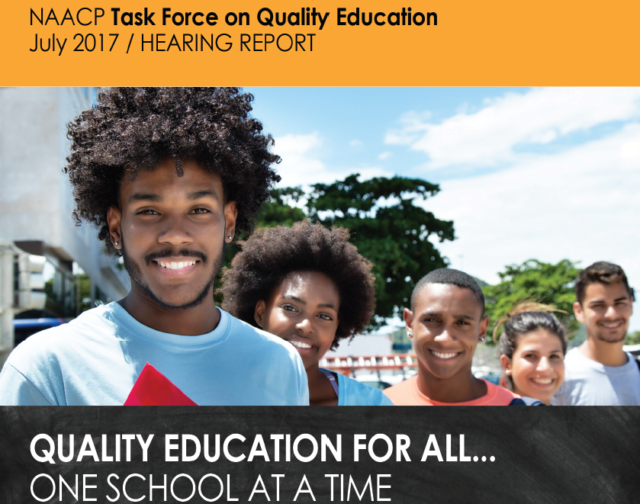
Back when the Obama administration and the Billionaires Boys Club were subsidizing rapid charter expansion, their soundbite was that choice-driven and accountability-driven reform was the “civil rights movement of the 21st century.”
Recently, however, the NAACP and other civil rights organizations have begun calling for a moratorium on charters. In a report published in July, the NAACP’s Task Force on Quality Education found that one in eight African American students attended a charter school. The Task Force concluded that, while charter schools remain part of the solution, the damage charter expansion has wrought must be addressed.
Charter schools offer gains and harm
The NAACP cited Julian Vasquez Heilig, who put the findings of pro-charter researchers in perspective. While charters can produce some gains, they can also do real harm to students. He testified:
I wanted to know how African Americans do under the CREDO study: 0.05 [standard deviations] is the impact of charters in the 2015 CREDO study. Which means that you need a telescope to see it. Class size reduction [has] 400% more impact. Pre-k? 1000% more impact than charters.
The NAACP drew upon research explaining that charter schools are “… more racially isolated than traditional public schools in virtually every state and large metropolitan area in the nation.” This segregation is bad for charter and traditional public school students because:
The relatively large negative effects of charter schools on the achievement of African America students is driven by students who transfer into charter schools that are more racially isolated than the schools they have left.
The NAACP’s study recommended tighter accountability and regulatory standards for charters. It also opposed for-profit charters (such as those promoted by Secretary of Education Betsy DeVos) and called for the expansion of “… proven reform models, such as early childhood education and community schools.”
What can OKCPS learn from the NAACP’s report?
Such a balanced report brings us back to Oklahoma City, where few charters have attempted to accept and retain their fair share of the kinds of poor and low-performing students that neighborhood schools serve by default. While Oklahoma already leads in early education, the OKCPS must form partnerships to get students on track in elementary school and successfully compete with charters. To provide compelling instruction that patrons seek, the district must shift resources from its top-down approach to one of teaching measurable skills and establishing wraparound services that create trusting environments where meaningful teaching and learning can flourish.
After 15 years, only one charter (Hupfeld Academy) has attempted to serve an entire high-poverty neighborhood, and it did so by becoming the type of full-service community school for which the NAACP calls.
The choice market in OKC is so maxed out that new charters can only be opened by raiding schools that are already doing well and luring away higher-performing students. It is easy to see a scenario where new federal funding, along with the state charter conversion law, will help charters to recruit more of the easier-to-educate students.
It won’t be easy
It won’t be easy, but the OKCPS must face the fact that, although many federal and (previously) state programs and laws have damaged the OKCPS, such mandates will only become a mortal threat if the district steps into their punches. For example, under the new ESSA federal law being implemented by Oklahoma’s professional State Department of Education, the OKCPS doesn’t have to comply with top-down testing dictates. In that sense, the OKCPS no longer needs to use bubble-in test scores as ammunition in a defensive battle against competition-driven reformers.
Rather than losing our tempers about the over-supply of charters, we should learn from balanced analyses, such as the NAACP’s recent study, and return to science-based policies to improve our poorest schools. Put simply: The district can now borrow from the best, not the worst, of charters.





















